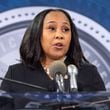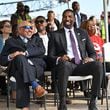Hartsfield-Jackson International Airport announced Monday it is now enforcing new restrictions on access to the terminal and other airport facilities 24/7.
The only people permitted to go to the airport are ticketed passengers, workers, people meeting and greeting passengers “and others who have legitimate business to conduct at the airport,” the Atlanta airport said.
According to Hartsfield-Jackson, police officers may approach people to “verify their purpose” at the airport. “Individuals may be asked to show their boarding pass or proof of airport business,” according to the airport.
Access will be restricted to the domestic and international terminals, parking decks, the SkyTrain and rental car center.
The airport said violators “are subject to arrest and prosecution.”
The Atlanta Journal-Constitution first reported in February the airport’s new policy to limit public access 24/7 with a change in the airport loitering ordinance. It said then that it would make the change in the next 60 days.
“The rationale for the legislation is, first and foremost, safety. This legislation enhances ATL’s ongoing work to maintain a secure and safe environment for passengers, workers, and vendors at Hartsfield-Jackson,” the airport said in a press release.
The world’s busiest airport in 2018 announced a policy of limiting access to the facility between 11 p.m. and 4:30 a.m., as it faced a growing issue of homeless people sleeping in the domestic terminal.
Hartsfield-Jackson is a public airport owned and operated by the city of Atlanta.
The new restrictions come as the airport deals with periodic issues of theft from baggage claim carousels, and complaints about unauthorized drivers soliciting passengers.
A city ordinance on the airport’s hours of operation says the hours are designated and posted by the airport manager — and when the airport is closed to the general public, the only people permitted are ticketed passengers, those helping them and airport personnel.
Los Angeles International Airport and Philadelphia International Airport have similar policies of closing to the general public 24 hours a day. Their policies were originally instituted in 2020 early in the COVID-19 pandemic as travel plummeted.
In Atlanta, there has long been an airport loitering ordinance, restrictions on drivers soliciting customers and a requirement to register to picket at the airport.
About the Author







